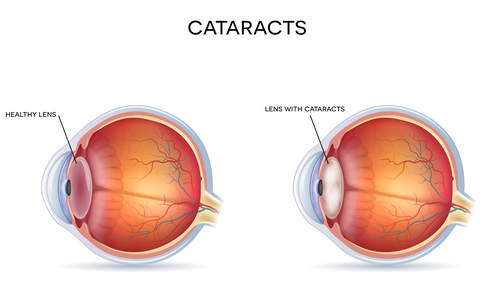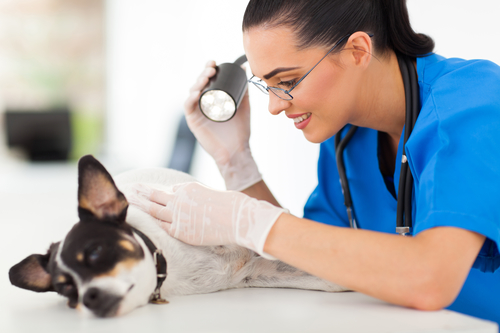Barring accidents and blindness from birth, there are still a number of reasons that your dog could be going blind. In most cases, your dog will be a senior dog, but that is not always the case.
If your dog becomes blind suddenly, you will probably figure it out pretty easily. An accident that damages her eye is obvious.
But what if the blindness comes on gradually? You may not put two and two together for a while.
Causes of Blindness in Dogs

Senior dogs are more likely to experience a loss of sight than younger dogs.
And if your dog has a disease or condition known to cause blindness, you should be more observant and on the lookout for signs that your dog is losing her sight.
Some common conditions that cause blindness in dogs are:
Diabetes – If your dog is diabetic, do make sure that it is under control. Uncontrolled diabetes has many side effects, and keeping diabetes under control can prevent some of them.
Cataracts – Dogs that have cataracts lose their sight gradually. You and your dog may not know that your dog is going blind for quite a while. Eventually you will figure it out, though.
Sudden Acute Retinal Degeneration (SARDS) – This condition causes loss of vision over several days, sometimes a few weeks. Most often seen in middle aged dogs, it is not treatable.
Retinal detachment – While this is an emergency, immediate treatment can save your dog’s vision. Retinal detachment can cause blindness in one or both eyes. Some dog breeds are more susceptible than others.
Symptoms of a Dog Going Blind

Just like people, dogs use their sight to judge distance and do a number of things. It is true, though, that it is not quite as important to your dog as it is to you.
A dog relies mostly on her sense of smell, then on hearing and then on sight and finally touch.
Often blindness is not sudden. Your dog may gradually lose more and more sight, until she can see very little or nothing at all.
If your dog is going blind, you may see these signs:
- Not showing recognition of family members until they speak or get very close.
- Mistaking a family member for a stranger and barking or growling.
- Misjudging the distance to jump into the car or onto the bed or sofa, and falling.
- Not chasing squirrels or the neighbor’s cat, if your dog usually loves a chase.
- Bumping into furniture and other things, especially in unfamiliar places.
- Disorientation and getting “lost”, even in his own home.
- Wandering off outside and being unable to get home.
- Personality changes – showing fearfulness, aggression or withdrawal
If your dog has had sight and is now blind, he may sleep and be depressed for a while. This is an adjustment for him.
However, he will adjust to his blindness and will probably do better than you. It is important that you accept your dog’s blindness and expend your energy on helping her learn how to cope in her new environment.
If you believe that your dog is becoming blind, you should have your vet examine her. Not all conditions are permanent, and there may be a treatment to help.
In the meantime, there are ways to make it easier for your dog, by altering a few things in your home and by purchasing a few accessories to help your dog get along.







Leave a Reply